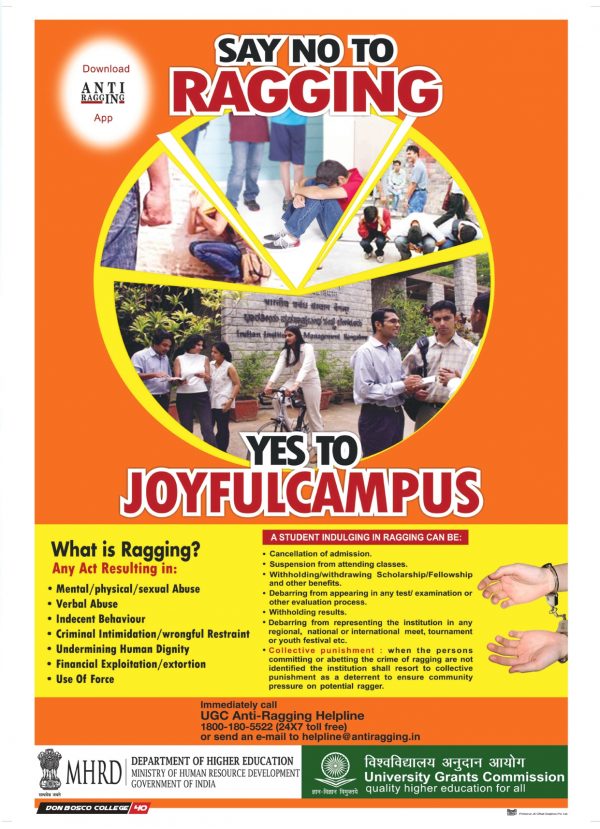Don Bosco College Golaghat, Assam

Anti-ragging refers to the measures and initiatives taken to prevent and address acts of ragging in educational institutions, particularly colleges and universities. Ragging involves any form of physical or mental harassment, abuse, or humiliation inflicted on students, typically by their seniors or peers. It is considered a serious problem that can have severe physical, psychological, and emotional consequences for the victims.
To combat ragging and create a safe learning environment, educational institutions, along with governmental and non-governmental organizations, have implemented various anti-ragging policies and measures. Here are some common strategies:
Awareness Campaigns: Educational institutions conduct awareness campaigns to educate students about the negative consequences of ragging. These campaigns often include workshops, seminars, and presentations that emphasize the importance of respect, empathy, and dignity towards fellow students
Strict Rules and Regulations: Institutions enforce strict rules and regulations against ragging. They develop and implement anti-ragging policies that clearly define ragging, its consequences, and the disciplinary actions that will be taken against the perpetrators.
Anti-Ragging Committees: Educational institutions form anti-ragging committees comprising faculty members, administrative staff, and student representatives. These committees are responsible for monitoring and addressing any incidents of ragging. They also provide a platform for students to report ragging anonymously.
Grievance Redressal Mechanisms: Institutions establish grievance redressal mechanisms, such as helplines or dedicated email addresses, to allow victims or witnesses of ragging to report incidents confidentially. These mechanisms ensure prompt and appropriate action against the perpetrators.
Sensitization Programs: Educational institutions organize sensitization programs for both seniors and freshers to promote a healthy and respectful campus environment. These programs focus on building positive relationships among students, promoting empathy, and discouraging any form of ragging or harassment.
Counseling and Support: Institutions provide counseling services to victims of ragging to help them cope with the emotional and psychological trauma. Additionally, support groups or helplines may be set up to offer assistance and guidance to those affected.
Legal Measures: Ragging is illegal in many countries, and stringent laws have been enacted to deter such activities. Perpetrators can face criminal charges, fines, and even imprisonment if found guilty of ragging. These legal measures act as a deterrent and ensure the safety of students.
It is crucial for all members of the educational community, including students, faculty, and staff, to actively participate in preventing ragging and promoting a healthy and respectful learning environment. By implementing these anti-ragging measures, educational institutions can work towards eradicating ragging and fostering a safe and inclusive campus for all students.



